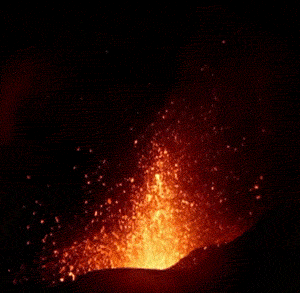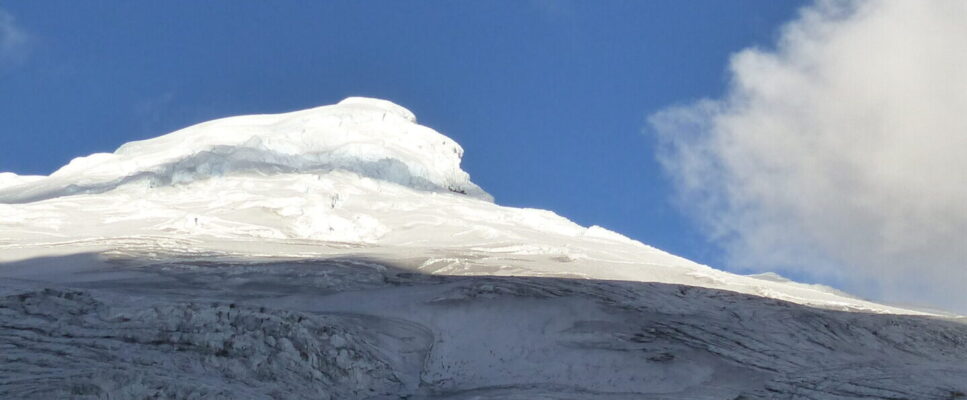
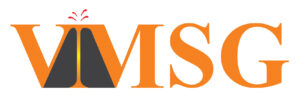
Welcome to the end of summer and another VMSG newsletter! At any time of year, you can find here news about the UK & Ireland volcanology community. This issue (the penultimate of 2023) is extra-big, so here’s a run-down of what’s in store. First, we have a retrospective on the VMSG workshop on Researchers Responding to Volcanic Crises that took place in July 2023. Following that, we hear about the first-ever Dublin Volcano Day. We move further afield to Berlin for a report on the IUGG2023 conference, before calling for new members to join the IAVCEI CVS. Next up, a slew of VMSG-specific news: a brief update on the VMSG2024 conference in Bristol, news on VMSG Committee turnover, three VMSG Student Bursary reports, and recent VMSG award winners. We note Tamsin Mather’s recent appearance on the Infinite Monkey Cage podcast, before ending with our Regular Round-Up of jobs, vivas, and funding announcements. Happy reading. – Ailsa Naismith
What do a poem, a map, and a suite of rocks have in common? They are all ways in which we remember and make sense of the experience of a volcanic eruption. 45 members of our community met in the John Flett Lecture theatre of the Natural History Museum on the 3rd of July to consider the various ways in which we respond to volcanic crisis, with a particular focus on the Eastern Caribbean as a case study. We began by considering the impact that colonial practices have had on the development of the research field and practises in the UK, and how we can ensure we do not reproduce these today.
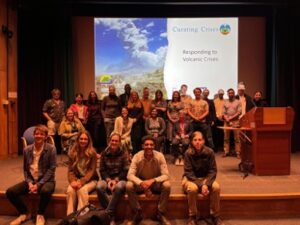
Some of our workshop participants (Photo: Lara Mani).
We then moved on to consider present day response to crises, how we can fund research in that moment, and the various challenges that present themselves to us. Pat Joseph and Richie Robertson from SRC gave the invited lecture about their experiences responding to the 2020-2021 volcanic eruption of La Soufrière, St Vincent. In responding to a volcanic crisis it is (almost always) true that there is also a ‘crisis’ in that the eruption is exposing vulnerabilities and causing real problems for local populations. In going to a volcanic eruption site you should honestly ask of yourself the question: why are you there? During discussions the group agreed that it would be good to further consider the ethical dimensions of working in this environment, and further drill into the issues specific to different areas of volcanology, the gathering of samples, data and implicit use of resources – perhaps one for a future VMSG workshop!
The second half our discussions focussed on the profound influence on experience and perspectives that is exerted by working on and around an active volcanic system. Its perhaps why volcanologists often embrace and develop interdisciplinary ways of working and thinking. We discussed ways in which we can better support our community to gain those experiences while remaining respectful of communities at risk. The full meeting summary can be found here. – Jenni Barclay, David Pyle, Teresa Armijos and Chiara Petrone
This summer saw the first Dublin Volcano Day, which brought together volcanology researchers from Trinity College Dublin, University College Dublin and the Dublin Institute of Advanced Studies for a day of presentations and networking, supported by the iCRAG Research Centre. Dublin Volcano Day was held on 10 May 2023 at the beautiful Museum Building of Trinity College Dublin. The event was attended by approximately 35 researchers at all career levels, reflecting the recent growth of a strong volcanological research community on the island of Ireland.
Presentations spanned a wide range of topics in geology, geochemistry/petrology, geophysics and rock mechanics, with both basic and applied objectives. These included a truly global range of study sites, from Antarctica to the Galapagos Islands. However, a particular highlight was the resurgent interest in how under-explored aspects of Irish geology can be used to address first-order outstanding research questions, including novel analyses of maar-diatremes in the Limerick Basin and classic localities in the North Atlantic Igneous Province. The event concluded with a brainstorming activity to develop an inter-institutional outreach project, which will introduce the Irish public to the range of volcanological landforms in their natural environment.
The intention is to replicate Dublin Volcano Day annually as a means of building ties between Irish institutions and continuing to develop an Irish volcanology community, embedded within VMSG. – Mike Stock & Claire Harnett (co-organizers)
IUGG (the International Union of Geodesy and Geophysics) hosts their conference every four years. IUGG is an international organisation that comprises eight semi-autonomous Associations, of which IAVCEI (the International Association of Volcanology and Chemistry of the Earth’s Interior) is one! The IUGG conference is therefore an important meeting for geoscientists worldwide, including us volcanologists. IUGG2023 was held on 11-20 July at the Berlin CityCube. Berlin is a progressive, inclusive city, and we were treated to bright sunshine in a beautiful location for the duration of the conference. The scientific programme included sessions across a broad spectrum of volcanology: from modelling of magma deformation, interactions between volcanic eruptions and climate, to historical volcanology. Our personal highlights were Sessions V09 (Advanced Remote Sensing Techniques to Study Volcanic Hazards) and V04 (Integrated Approaches to Pyroclastic Density Currents).
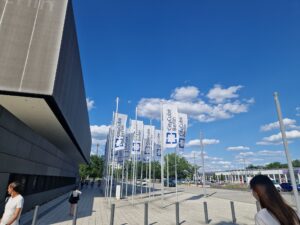
The 2023 conference was the first time that IUGG included several “Big Themes” in its program, such as EDI issues, ECR concerns, and interactions between the Global North and Global South. We were pleased to see these themes included in the program, and delighted that the IUGG are starting to place these conversations on the stage at large, international conferences. As these conversations become more familiar at IUGG, we would really like to see the organization build on these by using their platform to elevate voices of those that are often under-represented in our community.
We were impressed by the multiple contributions to IUGG2023 of IAVCEI members, both in their scientific efforts (including informative posters and engaging talks) and in their willingness to ‘stand up and be counted’. From debating the current IAVCEI bylaws in the IAVCEI General Assembly, to urging the panel of the EDI Big Theme to consider how conference fees impact who can attend in person, individual members of our community raised their voices to call for progress for everyone across the geosciences. There was a relatively small number of IAVCEI delegates at IUGG2023. This may be partly because many attended IAVCEI2023 in New Zealand earlier this year.However, the conference is an essential part of our calendar and a valuable opportunity to talk with people from other areas of geoscience about these issues. IUGG also provides funding to IAVCEI which is contingent on attendance of IAVCEI members to IUGG conferences. We would love to see more IAVCEI members at future IUGG assemblies!
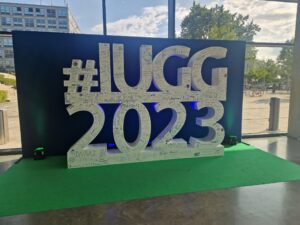
IUGG2023 is especially important for IAVCEI members because it hosts the IAVCEI General Assembly (not to be confused with the IAVCEI Scientific Assembly, also every 4 years, next held in Geneva in 2025). The IAVCEI GA is an opportunity for the IAVCEI Committee to speak with the community about the advances that have been made by the community, and to award members for outstanding contributions (N.B. look out for them later in the newsletter). This year, the GA also included proposals to change various statements within the bylaws that govern IAVCEI’s proceedings. This led to lively discussions within the volcanological community present in Berlin. The general take-home message from this discussion seemed to be a feeling that perhaps an overall review of the bylaws is required to ensure they accurately reflect the full breadth of awesome volcanologists in our community, including those who might have entered the field through non-traditional academic routes. We really welcome these discussions going forward.
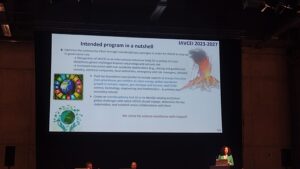
In the IAVCEI GA, the newly-elected IAVCEI Committee shared their vision for their tenancy (2023 – 2027). This vision aims to build an inclusive, diverse community that gives voice to underrepresented groups (e.g., enriching the governance of IAVCEI through greater inclusion of underrepresented groups in leadership roles, commissions, and other prominent roles). This is a promising time for members of the VMSG to collaborate with IAVCEI and IUGG toward improving our community. Though the conversations at IUGG may be just beginning, we see a huge opportunity for volcanologists from the UK and Ireland to share our learning within VMSG with the greater volcanological (IAVCEI) /geological (IUGG) community. So, look for opportunities to get involved: to disseminate your science, to share your learning, and to make your voice heard on the wider stage. – Claire Harnett & Ailsa Naismith
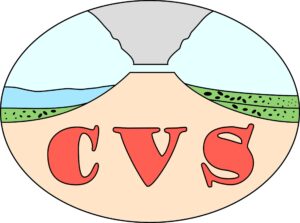
The IAVCEI Commission on Volcanogenic Sediments (CVS) fosters common interests in research on all sedimentological aspects of volcanic phenomena, including the genesis, transport, deposition and diagenesis of all volcanogenic sediments. The scope of CVS is broad: from ash clouds to debris avalanches, from process to product, from hazard analysis to constructing facies models, from modern to ancient systems, and from purely volcanological to purely sedimentological perspectives.
The new co-leaders of CVS, Andrea Di Capua and Rebecca Williams, are looking for new committee members to support a wide range of CVS activities such as webinars, workshops, encouraging collaborations and hosting conference sessions. We’re looking for volunteers from all career stages, from across the globe. If you are interested, please email us at rebecca.williams@hull.ac.uk with a ~300 word expression of interest, letting us know why you would like to be involved and what role may interest you (e.g., Webmaster, ECR Representative, Social Media Officer, Secretary, EDI Officer, Events Officer, Ordinary member). – Rebecca Williams
Preparations are underway for the next VMSG conference, which will be held on 3-6 January 2024 at the University of Bristol. Follow this link to the official VMSG2024 website, which contains information on the conference schedule, venue, and travel and accommodation. More news (including conference registration) will be shared soon via the VMSG mailing list (so make sure you have subscribed). – University of Bristol Local Organizing Committee
This season marks a significant turnover of the VMSG Committee, as several positions have either changed recently or will change in January 2024. Below, we share a little about each position and hear from the people who have occupied these roles.
The VMSG Committee is seeking to recruit for three positions beginning in January 2024: Social Media Officer, Student Rep (to join Kerys Meredew), and Newsletter Editor. If you are interested in applying for one of these roles, please get in touch with the current post-holder via the contact details beside their blurb! Look out for an official call for these three positions that will be posted by our secretary, Seb Watt, on the VMSG JISCmail later this autumn.
This year, Janine Kavanagh left her position as the VMSG Secretary and the new post-holder, Seb Watt, joined. The VMSG Secretary plays an essential role within VMSG, working with the President and the Treasurer as part of the core VMSG Executive Committee. We are hugely grateful to Janine for the enthusiasm and dedication that she has brought to her role during the last four years. Her involvement has ensured that committee meetings and events throughout the year occur smoothly and in good spirits.
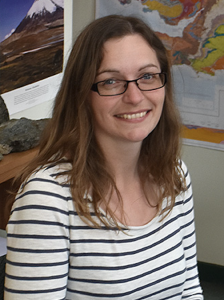
Janine says: “It’s been a real honour to serve the VMSG community as the VMSG Committee Secretary these past 4 years, which has spanned pre-Covid times, full lockdown, and now the ‘post-Covid’ era. It’s been heart-warming to see how so many on the VMSG Committee and the VMSG membership have given their time and energy to help build a strong community of volcanologists across the UK and Ireland. It’s also been completely inspiring to work alongside such passionate and talented individuals and to see how teams have come together to run great events, such as the annual conference, workshops and panel discussions. I’m particularly grateful to have had the opportunity to help develop new policies related to code of conduct, awards and running meetings, and it’s been a privilege to support the VMSG in leading efforts to improve equality, diversity and inclusion practices. Special thanks to all the Committee members I’ve had the pleasure to work with these past 4 years, particularly to the past and present VMSG Chairs Sally Gibson and Tamsin Mather for being fantastic role models, and to Seb Watt for taking on the Secretary role going fowards. I look forward to seeing many of you in January in Bristol as the VMSG celebrates its 60th anniversary!”
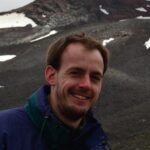
Seb says: “I’d like to thank Janine for all of the work she has put in to VMSG over the past few years, and am greatly looking forward to taking on the secretary position and to working closely with the rest of the committee and wider VMSG community”.
We warmly welcome Seb as the new Secretary and look forward to working with him in the coming years!
Dr. Katie Preece (University of Swansea) took over as the Committee’s EDI Officer from Dr. Jazmin Scarlett, who has left volcanology to work as a Flood Resilience Officer at the Environment Agency. We are hugely grateful for Jazmin’s work during her tenancy as the VMSG EDI Officer and her contributions to the volcanology community. Meanwhile, we are excited to have Katie in the committee and look forward to working with her.
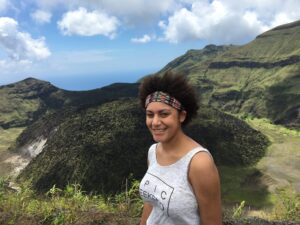
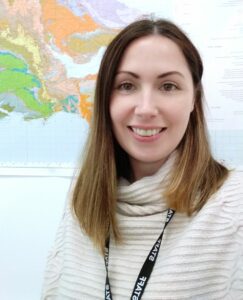
Jazmin says: “As the EDI Officer, I conducted a couple of firsts for VMSG: conducting the first EDI audit of the awards and bursaries for the committee to make improvements and hosting the first EDI forum at VMSG in London. I enjoyed working with the committee, MinSoc and the VMSG community to find ways to improve EDI in UK volcanology and I wish everyone and Katie the best of luck and good fortune.”
Katie says: “I’m excited to have recently joined the committee as the incoming Equality and Diversity Officer. One of the first things I’m working on is the VMSG EDI Report 2023. As part of this, we’ll be surveying VMSG members on various issues, so please look out for an email coming soon with more information!”
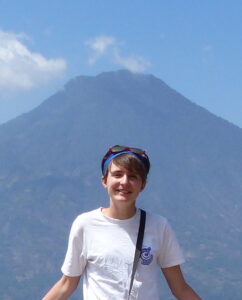
Hello – I am the person who put this newsletter together! It has been an absolute pleasure to be the VMSG Newsletter Editor since January 2021. My favourite part of the role is the creativity involved in designing the newsletter, including the individual twists one can add (I will miss finding a new quote every three months). I also love feeling connected to volcanologists across the UK & Ireland through the editorial responsibilities of soliciting updates and highlights from our community. I look forward to seeing what the next editor will do!
If you would be interested in taking the Newsletter role, contact me to find out more at: ailsa.naismith@bristol.ac.uk
Dr. Elliot Carter (Trinity College Dublin) has been the Committee’s Social Media Officer for three years, working tirelessly to share and promote VMSG activities across myriad social media accounts. The reach of the VMSG has been massively increased by his efforts. Thanks, Elliot!
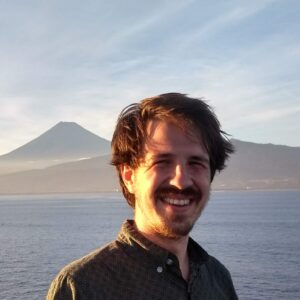
Elliot says: “My role has been to manage the various VMSG social media accounts (Twitter, Instagram, Facebook and YouTube) and to publicise what VMSG is up to, whether that’s news, opportunities, workshops, awards, or recorded talks from the annual conference. I’ve really enjoyed my time on committee and I can’t believe three years have gone by so quickly. I’ve got a lot of highlights but what particularly surprised me was the sense of community among the committee, especially through various lockdowns when virtual coffee breaks were a lovely dose of friendly company.”
If you would be interested in taking the Social Media role, ask Elliot for details at: ELCARTER@tcd.ie
Eilish Brennan (University of Leeds) has been a student rep since November 2021 as an enthusiastic and engaged member of our team that it has been a pleasure to work with.
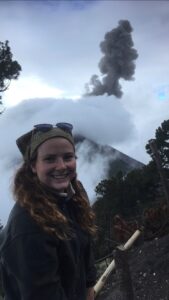
Eilish says: “It was a pleasure to be on the committee for the past two years. It has opened my eyes to all the branches of volcanic and magmatic studies and the amazing students pushing science in these areas. I spent most of the term working with Emma and Kerys, as well as many other of the committee members, to improve the student resources within the community. A final highlight would have to be the VMSG outreach day at the NHM following the January conference.”
If you would be interested in taking the Student role and working with Kerys Meredew (University of Birmingham), our other student rep, contact Eilish for more info at: eeebr@leeds.ac.uk
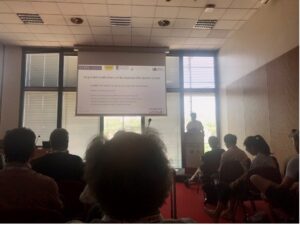
Title slide of my Afar plume presentation.
I was thrilled to be able to present two projects from my PhD research at the July 2023 Goldschmidt conference, held in Lyon, France. It was my first in-person conference meeting after the COVID-19 pandemic. I made two oral presentations, building up two chapters of my PhD research. The first talk was entitled ‘Origin and implications of He-depleted Afar mantle plume’ in the session, ‘Distribution and role of deep mantle volatiles on Earth evolution’ within the theme ‘The dynamic deep Earth’. I presented the latest models from this project, where we investigated high 3He/4He but low He content of Afar plume using Red Sea basalt glasses. The second presentation was entitled ‘High resolution He isotopes from Reykjanes Ridge MORB support pulsing Iceland plume’ in the ‘Insights on the formation, preservation and transport of mantle compositional heterogeneities’ session within the same theme. In this talk, I presented new precise 41 He isotope measurements from basaltic glasses along 55 – 63oN Reykjanes ridge and its implications on the pulsed Iceland plume. Both presentation slots were 15 minutes, so I had enough time to wrap up all the results and models. I got excellent feedback for both studies, especially for the second presentation, which is still an ongoing project. It was a very interactive and engaging conference meeting. It was great to see old friends and colleagues after a long time and meet new ones, especially for a 3rd year PhD student. The only difficulty was Lyon’s scorching weather, considering after Glasgow’s ‘summer’ days… – Ugur Balci
Ugur studies at the University of Glasgow. Find Ugur’s work here.
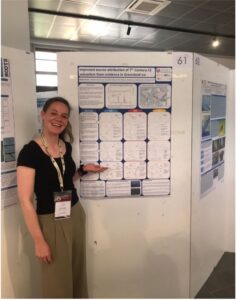 Thanks to the VMSG student travel bursary, I was able to attend the INQUA2023 (International Union for Quaternary Research) congress in Rome, in July. Held every 4 years, INQUA 2023 was a perfectly timed opportunity to present my research and network as I come to the final stages of my PhD studentship. I greatly enjoyed attending many sessions which covered themes highly relevant to my research, including tephrochronology, volcanic impacts on climate, and ice core related research.
Thanks to the VMSG student travel bursary, I was able to attend the INQUA2023 (International Union for Quaternary Research) congress in Rome, in July. Held every 4 years, INQUA 2023 was a perfectly timed opportunity to present my research and network as I come to the final stages of my PhD studentship. I greatly enjoyed attending many sessions which covered themes highly relevant to my research, including tephrochronology, volcanic impacts on climate, and ice core related research.
I was fortunate to have two abstracts accepted and presented twice during the conference – an oral presentation, “Identification of the Los Chocoyos supereruption in polar ice and marine sediment cores: climate and stratigraphic implications” in a session focussing on environmental changes and linking records during MIS 5d-a, and a poster presentation, “Improved source attribution of 7th Century CE volcanism from evidence in Greenland ice” during the Volcanic Impacts on Climate and Society (VICS) session. Presenting in these two differently themed sessions was an excellent experience, and I enjoyed varied questions and follow up discussions with researchers who had a broad range of interests and perspectives. With both of my presentations falling on the same day (during the peak of the southern Europe heatwave!), I was delighted that the VICS afternoon session was followed by a social meet-up where I could catch up with colleagues and friends from the VICS community over an Aperol!
Overall, attending an international conference at this point in my career was a thoroughly valuable experience, and provided me with a large injection of enthusiasm for the final months of thesis writing and beyond. – Helen Innes
Helen studies at the University of St. Andrews. Find Helen’s work here.
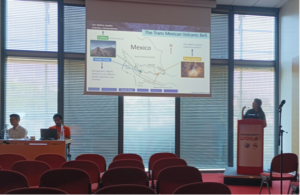
Mobile Chalcophile Element Subduction Fluxes in a Continental Arc Setting
I recently had the opportunity to attend the Goldschmidt 2023 geochemistry conference in Lyon, France, with the support of a VMSG student bursary. This was my first big conference presentation, and I had a lot of nervous excitement at the beginning of the week. The conference itself was overwhelming and absolutely jam-packed with workshops, fantastic research posters and good conversation across all disciplines of geochemistry. Over the conference week there were several excellent plenary lectures, including a talk by Lawrence Meinert who was able to bring together both wine and geochemistry.
I presented a talk on my work on the behaviour of mobile chalcophile elements across the Trans Mexican Volcanic Belt, which focussed primarily on the behaviour of these elements relative to well-known geochemical proxies, and element variations across an arc. The talk was a great experience, and I was able to gain valuable feedback from fellow researchers in the field and make some new contacts along the way.
The final day of the conference coincided with Bastille Day celebrations with spectacular fireworks and celebrations throughout the evening, a perfect conclusion to a great week. Overall, the conference week was a memorable experience, and I am very thankful to the VMSG for giving me the opportunity to attend! – Clara Matthews Torres
Clara is a member of the London NERC DTP. Find Clara’s work here.
We are delighted to announce the winners of several VMSG awards:
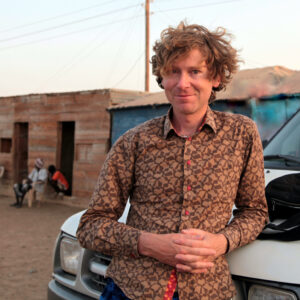 Thermo-Fisher Award
Thermo-Fisher Award
The Thermo-Fisher Award is made annually to an individual who is deemed to have made a significant contribution to our current understanding of volcanic and magmatic processes. This year’s award-winner is Professor Clive Oppenheimer (University of Cambridge). Clive has an incredibly distinguished career and given insights into volcanic systems around the world. Clive is invited to deliver the a keynote lecture at VMSG2024 in Bristol.
Find Clive’s research here. And he’s got his own Wikipedia page – find it here!
Zeiss Postdoctoral Keynote Award
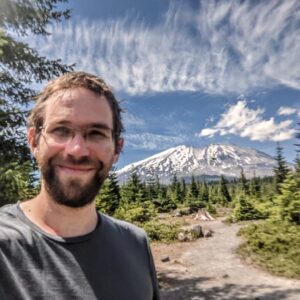
The Zeiss Postdoctoral Keynote Award is made annually to the lead author of an outstanding paper on a topic within the VMSG remit, who has also made an exceptional contribution to supporting individuals or the wider research community, or to broader society, commensurate with their early career stage. This year’s award-winner is Dr. Martin Mangler (University of Durham), for their paper, “Variation of plagioclase shape with size in intermediate magmas: a window into incipient plagioclase crystallisation”. Martin is invited to present their research as a keynote speaker at VMSG2024.
Read Martin’s paper here. See Martin’s profile here.
Willy Aspinall Prize
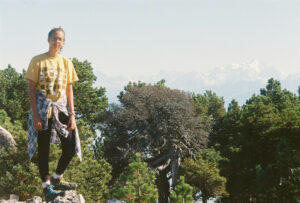
The Willy Aspinall Prize is awarded annually to the lead author of an outstanding paper on applied volcanology or geoheritage published in English, who is within three years of their being awarded a PhD at a university in the UK. This year’s award-winner is Dr. Edna Dualeh (University of Bristol). Edna’s paper, “Rapid pre-explosion increase in dome extrusion rate at La Soufrière, St. Vincent quantified from synthetic aperture radar backscatter“, was deemed a worthy winner by the judging panel. Edna is invited to present a talk on the paper at VMSG2024.
Read Edna’s paper here. See Edna’s profile here.
Once again, huge congratulations to all our winners!
We wish to congratulate VMSG alumni who were awarded for their contributions to volcanology at the IUGG2023 conference in Berlin this July. Dr. Thomas Jones received the George Walker Award, Professor Kathy Cashman received the Thorarinsson Medal, and Professor Michael Heap received the Wager Medal. These people have contributed greatly to the UK and Ireland volcanological community and we are delighted to see their efforts recognized!
Also honoured at the IAVCEI General Assembly were Professor Karen Fontijn (Fisher Medal) and Dr. John Pallister (Krafft Medal). Many congratulations!

The question that occasionally concerns all of us: should we be worried about supervolcanoes? VMSG President, Tamsin Mather, appeared on the Infinite Monkey Cage radio show recently to talk about enormous past eruptions (including one that may have sparked the French Revolution) and whether volcanologists can forecast impending eruption. This episode of the show, hosted by Brian Cox and Robin Ince, also featured geologist Chris Jackson and comedian Rachel Parris. You can listen on BBC Sounds here.
Dear VMSG community,
Please spread the word! We are looking for an enthusiastic student for a PhD position at The University of Auckland (New Zealand) with a placement at Lancaster University (UK). The project aims to explore tsunamis generated by pyroclastic density currents.
Exploring the tsunamigenic potential of pyroclastic density currents
Recent research has demonstrated that highly mobile pyroclastic density currents (PDCs) are able to displace large volumes of water and generate tsunami waves. However, a complete mechanistic understanding of the wave generation by a PDC, required to predict the properties of the generated waves under a range of conditions (including high temperatures), is still lacking. This project will combine physical experiments and numerical simulations to gain further insights into the tsunamigenic potential of PDCs. It will also leverage international collaborations and you will have the opportunity to conduct placement(s) at Lancaster University, UK, to explore the complex role played by the PDC internal structure and composition (including grain size and shape distribution) in the fluidisation, downslope motion, and wave generation of the PDC. Scale effects will be considered as part of the experimental work.
The project will be co-supervised by Dr. Colin N. Whittaker, Dr. Natalia Lipiejko and Dr. Thomas J. Jones. For more information, please contact Dr Colin Whittaker (c.whittaker@auckland.ac.nz).
Please forward this to anyone you feel would be interested. There is no deadline for application – the school is looking for a good candidate. – Dr. Natalia Lipiejko
The University of St. Andrews seeks to recruit a postdoctoral research fellow for the UKRI-funded project “Taking Earth’s volcanic pulse: understanding global volcanic hazards by unlocking the ice core archive”. The opportunity will apply novel techniques to extract new information on source, type, and climate impact of past volcanism from ice core records. The role focusses on cryptotephra records which will be used to pinpoint geotectonic setting and source of past eruptions.
The closing date for applications is Friday, 29 September 2023. Full details for the role are available here.
We wish to congratulate several newly-minted volcano doctors. Dr. Annika Voight (University of Oxford) successfully defended her thesis on “Exploring experimental Trachydacite magma storage and ascent of the 1257 Samalas eruption” in July. Dr. Amy Peach-Gibson (University of Plymouth) recently aced her viva on “Historic and prehistoric volcanic activity at St Kitts and Nevis, West Indies – controls on future hazard”, and Dr. Emma Watts (University of Southampton) successfully defended her thesis on the evolution of volcanism in the Afar region of Ethiopia in August. Well done to you all!
Do you have any job opportunities, PhD viva voce celebrations, or funding opportunities that you would like to advertise in this area? If so, please get in touch with ailsa.naismith@bristol.ac.uk .
Don’t forget to keep in touch with us and other volcanologists around the world. There are several ways you can do this: through the VMSG PhD and ECR directory (here), the Arizona State University mailing list (here), and the VMSG mailing list (here).
